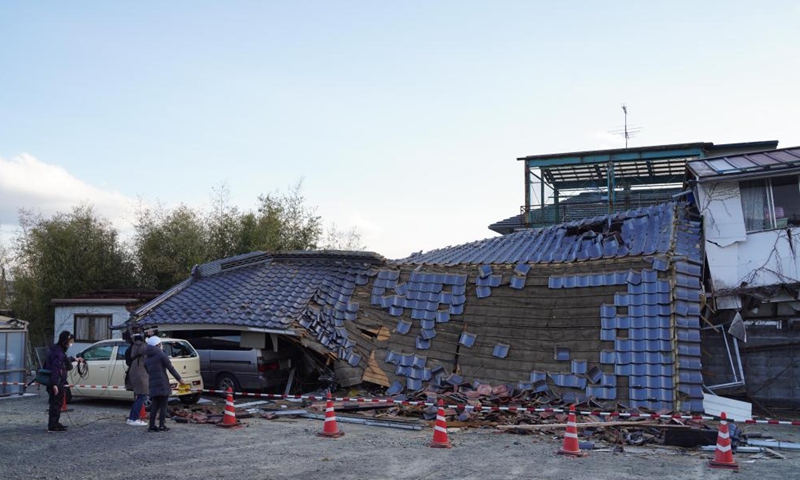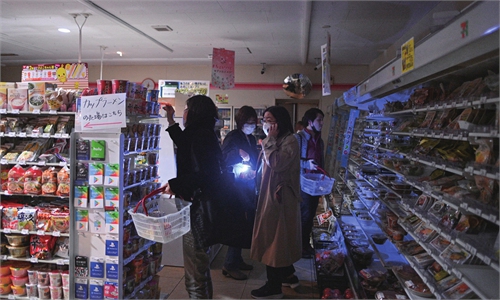Japan shouldn't allow another nuclear leak cover-up after Fukushima earthquake: Global Times editorial

Photo taken on March 17, 2022 shows a damaged house after an earthquake at Kunimi-machi, Fukushima Prefecture, Japan. A 7.3-magnitude earthquake hit northeastern Japan on late Wednesday night. (Xinhua/Zhang Xiaoyu)
Eleven years after Japan's March 2011 earthquake, a 7.4-magnitude earthquake hit the coast of Japan's eastern Fukushima prefecture on Wednesday, leaving at least four dead and more than 100 wounded. Affected by the quake, more than 2 million households in the Kanto region in eastern Japan lost electricity power, with many buildings on fire or damaged. A Tohoku Shinkansen bullet train that was running in Miyagi Prefecture derailed after the earthquake. We first express our condolences to the people affected by the disaster and hope that they can be properly settled as soon as possible. We also hope that there will be no more casualties in the future.
Local people are very concerned about the safety of the Fukushima nuclear power plant. This is also the common concern of Japan's neighboring countries, including China. Nuclear security is not trivial. Fukushima's nuclear leak was not properly addressed last time. It is hoped that Tokyo Electric Power Company (TEPCO) and the Japanese government can learn from the last painful lesson, be highly responsible to their own people and neighboring countries, release timely the relevant information in a transparent way, and assume their due responsibilities and obligations.
Japanese Prime Minister Fumio Kishida told reporters earlier on Thursday that no abnormalities were reported at any nuclear plant. Japan's Nuclear Regulation Authority said in a statement that there was no leak of radioactive substances in the country's nuclear plants, noting it won't issue a new notice unless there is special abnormality. We hope this is a blessing in misfortune, but such ambiguity and understatement hardly assuages others' doubts, and such an attitude is by no means responsible either.
We would like to ask, how did TEPCO confirm the safety of these storage tanks for nuclear-contaminated water in just a few hours this time? Have Japanese regulatory authorities confirmed what TEPCO said? TEPCO acknowledged on May 20 last year that corroded seawater had leaked from storage tanks at the Fukushima nuclear power plant and that some radioactive material had been released into the sea, two months after the leaks began.
TEPCO, a company monopolizing Kanto in terms of electricity, is a "model" of Japanese corporations in providing political donations. It has a close relationship with the Japanese government, and some people even use "symbiosis" to describe the two. The relationship between the Japanese government and TEPCO should have been one of supervision and enforcement, but it has become a mode of mutual benefit. TEPCO has covered up accidents and tampered with data many times, all under the cover of the Japanese government turning a blind eye. Nuclear power plants have formed interest groups with Japanese government regulatory authorities, nuclear industry experts and scholars, which has become a long-standing deceit. How could this make people not worried, or not concerned?
Fukushima and the entire region cannot afford another nuclear leak cover-up. Given its previous poor records, the international community should urge Japan to take practical action to properly handle various safety hidden risks. On the other hand, it's necessary that IAEA sends an expert team to Japan as soon as possible and conduct multilateral verification on issues of public concern. TEPCO cannot make the conclusion that "no abnormalities now". It must make continuous and full disclosure, rather than just make a perfunctory effort.
It must be noted that according to the discharge plan of the Japanese government and TEPCO despite opposition from neighboring countries, the large amount nuclear-contaminated water now stored in Fukushima nuclear power plant will be discharged into the Pacific starting next spring, and the process will last 30 to 40 years. Given the significant change of the situation, the discharge plan faces new uncertainties and risks. We have every reason to ask Japan to revoke this decision.
Nuclear leak and nuclear-contaminated water discharge concern global ecological environment safety and humanity's health. China and South Korea, as Japan's close neighbors, will be directly impacted. The two countries have repeatedly protested to Japan on the issue. But it's intriguing that the US has defended and connived with Japan, making the latter greatly emboldened. The US might feel that it is far from where Japan discharges the nuclear-contaminated water, and habitually puts geopolitical needs above international public interests.
It seems that the US and Japan share such irresponsibility and selfishness. But the impact of nuclear pollution, which is extensive and long-term, will harm all countries and regions along the Pacific coast, and the US cannot be spared. However, victims of Fukushima will bear the brunt as they will suffer a double blow of natural and man-made disaster. Wish they stay strong and safe.

